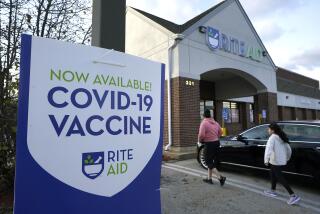Medicare HMO Ads Aimed at Healthiest Seniors, Study Finds
- Share via
WASHINGTON — Many health maintenance organizations that serve Medicare recipients engage in advertising and marketing practices designed to attract the healthiest and most profitable senior citizens, according to a study released Monday.
The HMOs make pictures of healthy-looking and active senior citizens the focus of their television and newspaper ads, while some health plans hold recruiting seminars at sites not accessible to people in wheelchairs, according to the study by the Kaiser Family Foundation, a nonprofit research group not affiliated with the Kaiser Permanente health maintenance organization, and by the public relations firm Porter Novelli.
“Medicare HMOs appear to target physically and socially active seniors rather than beneficiaries in poor health,” according to the study, which was based on a review of ads in Los Angeles, Miami, Cleveland and New York.
HMOs run by Humana Inc., Cigna Corp. and Aetna Inc. are among those cited in the study for using advertising that focuses on healthy-looking senior citizens with photos of people hiking, swimming, biking and socializing.
Ads run by companies such as Prudential Insurance Co. of America and PacifiCare Health Systems Inc. tout benefits such as prescription drugs not offered by traditional fee-for-service Medicare while writing about plan restrictions in fine print too small for the average senior citizen to easily read, the report said.
At a panel discussion on the study Monday, there was consensus among people representing the industry and Medicare that the images shown in the HMO ads are consistent with advertising by other industries.
“If you look at cosmetic ads, you never see people with wrinkles,” said Karen Ignagni, president of the American Assn. of Health Plans, the nation’s largest HMO trade group.
She added that while advertising is a way of sparking people’s interest in a health plan, beneficiaries follow up by reviewing brochures and telephoning health plans to learn details about the benefits.
Still, the findings show that health plans cannot be the sole or even primary source of information for Medicare beneficiaries, said Diane Archer, executive director of the Medicare Rights Center, a group providing consumer assistance to program beneficiaries.
Medicare, which reviews HMO marketing materials before they go on the air or are published, has signed off on ads that contain incorrect information, according to the Kaiser Family Foundation study.
“The study found some examples of inaccurate, confusing or incomplete information that could result in beneficiary confusion,” the report says.
For example, eight out of 70 newspaper ads reviewed say people must be age 65 or older to enroll in a Medicare HMO--without adding that disabled Medicare beneficiaries under age 65 are also eligible to enroll.
An HMO said in one newspaper ad that its enrollees don’t need to help pay for services provided by doctors not affiliated with the health plan, while the fine print contradicted that statement by saying that a co-payment applies under specific circumstances, the study said.
In February, the inspector general of the Department of Health and Human Services said it is conducting a nationwide investigation to determine whether health plans have violated civil laws that prohibit Medicare HMOs from screening potential customers to weed out people with health problems.
More to Read
Inside the business of entertainment
The Wide Shot brings you news, analysis and insights on everything from streaming wars to production — and what it all means for the future.
You may occasionally receive promotional content from the Los Angeles Times.










